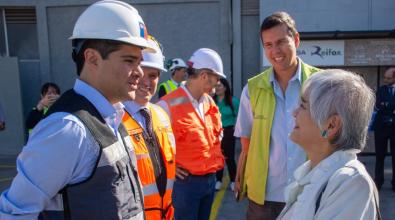 Read More
Read More
How citywide data strategies can connect the dots, drive results

Baltimore's Brandon Scott is one of a growing number of mayors integrating citywide data strategies in their city halls.
Data is more central than ever to improving service delivery, managing performance, and identifying opportunities that better serve residents. That’s why a growing number of cities are adding a new tool to their arsenal—the citywide data strategy—to provide teams with a holistic view of data efforts and then lay out a roadmap for scaling successful approaches throughout city hall.
These comprehensive strategies are increasingly “critical to help mayors reach their visions,” according to Amy Edwards Holmes, executive director of The Bloomberg Center for Government Excellence at Johns Hopkins University, which is helping dozens of cities across the Americas up their data games as part of the Bloomberg Philanthropies City Data Alliance (CDA).
Bloomberg Cities spoke with experts in the field and leaders in pioneering cities to learn more about the importance of citywide data strategies and how they can help:
- Turn "pockets of promise" into citywide strengths;
- Build upon and consolidate other citywide strategic efforts;
- Improve performance management and service delivery;
- Align staff data capabilities with city needs;
- Drive lasting cultural change through leadership commitment.
Turn "pockets of promise" into citywide strengths.
Cities have come a long way in using data to improve outcomes for residents. But that work is often ad hoc or driven by key individuals in certain departments. While many cities now have key pieces they need in place, such as a data-governance committee, an open-data portal, or upgraded IT systems, what they don't always have is a strategy tying all those things together and driving toward common goals. That's what a citywide data strategy can do.
"Over time, we've seen certain agencies and certain programs within cities mature greatly in their data practices," GovEx's Holmes says. "You see these pockets of promise across cities, across any government you look at. But what you want is for that to be the routine across the whole city."
While every citywide data strategy may look a bit different, they all usually start with a vision for how to identify, store, provision, govern, and use data, and then build a roadmap on how to get there in terms of people, process, governance, and technology.
Build upon and consolidate other citywide strategic efforts.
One of the biggest hurdles in crafting a citywide data strategy is bringing so many dimensions of data work together in one plan—and doing so in a way that will remain relevant for years to come.
The CDA provides guidelines for cities as they start the process, including making sure plans are high-priority and aligned to the mayor's vision; achievable with specific, time-bound goals for city leaders; equitable with equity centered throughout; evidence-based using What Works Cities criteria; sustainable with support from staff, stakeholders, and residents; and impactful with the ability to lead to data-informed investments, policies, and operational decisions.
Working toward that alignment in Scottsdale, Ariz., began with a loose "data-program roadmap" that, since the city joined the CDA, has served as a springboard for a data-governance charter, one of the first data-service standards in the United States, and a citywide data strategy, adopted last month, that charts the city’s data goals—and how it will measure progress—over the next two years.
In Kitchener, Canada, city leaders were mindful of other existing municipal strategies—guiding technology, digital services, and equity—as they created a new data roadmap. That helped them fold their citywide data strategy into the city’s recently approved overall strategic plan. "We don't want people to see this as something separate," explains Courtney Zinn, director of Kitchener's Innovation Lab. "We want it to become part of their day-to-day and how they operate and see the importance of data in pretty much everything we do."
Improve performance management and service delivery.
A citywide data strategy can help leaders in a number of ways, including by providing a better view of city operations and performance to track against goals, presenting a clearer picture of broader environmental, economic, and social trends in the city; and guiding teams as they leverage new technologies, such as artificial intelligence or predictive analytics.
For example, the citywide data strategy in Charleston, S.C., lays the groundwork for enriching the city's performance management program, PriorityStat, in a couple of ways, including by integrating and automating performance dashboards so they reflect the city's progress in real time.
The citywide data strategy in Kitchener is unlocking opportunities by prioritizing an inventory of how data is being used throughout city hall. This inventory will be more than a list of datasets, Zinn explains. It will be key to ensuring the interoperability of data across departments while also paving the way for new efficiencies such as identifying and using repeatable practices and policies.
Align staff data capabilities with city needs.
A citywide data strategy shouldn’t stop at just building the technical capabilities of a city. It should also provide a key entry point for cities to drive culture change around how data is used and who throughout the city is putting it to work.
Kitchener's strategy strikes a good balance between the two areas of focus. On the technical side, it outlines the need for the city to establish a data governance committee and charter. On the human side, it calls for creating more training opportunities to help staff get more comfortable working with and asking questions with data. "More than the technology around all of this," Zinn explains, the strategy "is really about the people and building the culture."
Other good examples aligned to citywide data strategies can be found in Baltimore, where the city is deepening its staff's data literacy through the Baltimore Data Academy, and Charleston, where the city aims to send more employees to the BRIDGE Academy, a four-day training in process-improvement techniques that includes a healthy dose of training in data practices.
"It’s really important that everyone working for the city understands how the data they collect and the data they share is being used to help residents and improve the way they work," Holmes explains. "It takes time to educate people. But everyone should have a role in it, all the way from the top down through the managers and to frontline staff."
Drive lasting cultural change through leadership commitment.
While mayors don’t need to get into the weeds with the details, their leadership is nevertheless critical to making these efforts work. That means setting the vision that brings a purpose to the citywide data strategy and, by prioritizing this effort, motivating people to work across agencies to collaborate and get it done.
In Montevideo, Uruguay, Mayor Carolina Cosse championed the citywide data strategy throughout its development. Early on, she convened staff from across all departments to underline the importance of them using data and evidence, especially in budget requests. When she approved the strategy in May, she made sure it was published publicly and met with her directors to secure their commitment to implementation.
The mayor's support "allowed us to put together a team of people who are truly the envy of any other project," explains Chief Data Officer Damián Pintos. "One lesson learned here is how much easier it is to carry out a change process such as this one with clear political support."
What matters most to success, however, is that the mayor and top leaders actually use data to make decisions, demonstrating the value of this work for all to see. According to Holmes, "The best way to improve data is to show people it's important to use it. That's what we want to empower through citywide data strategies, is giving mayors that data when they need it, so they can make the best decisions to help people. That’s what this is all about."


